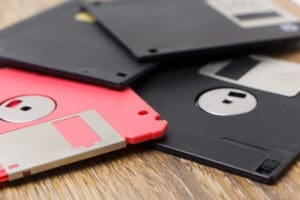 The BBC recently reported Japanese digital minister Taro Kono had “declared war” on floppy disks. Approximately 1,900 Japanese government activities still require the use of floppy disks, along with CD-ROMs and other outdated technology. Kono vowed to seek regulatory updates to allow government business to move online to the cloud—and said it was time to leave fax machines behind. (And, for the record, the U.S. reportedly still used floppies for nuclear operations as late as 2016.)
The BBC recently reported Japanese digital minister Taro Kono had “declared war” on floppy disks. Approximately 1,900 Japanese government activities still require the use of floppy disks, along with CD-ROMs and other outdated technology. Kono vowed to seek regulatory updates to allow government business to move online to the cloud—and said it was time to leave fax machines behind. (And, for the record, the U.S. reportedly still used floppies for nuclear operations as late as 2016.)
Floppy disks—like so many pieces of once-innovative technology—may seem like a joke nowadays, along with your dot matrix printer. But just over 50 years ago, the 1971 introduction of the 8-inch floppy disk at an IBM data storage unit in San Jose made it possible to replace 3,000 punch cards with a single 80 KB disk. IBM acquired patents for the floppy disk in 1972. The flexible plastic squares got dirty easily, so the solution was to store them in a dust-wiping envelope.
The 1977 introduction of the Apple II brought about the next innovation in floppy disks. The Apple II had two 5.25-inch floppy drives—which former IBMers now working as Shugart Associates had demonstrated for Steve Jobs and Steve Wozniak at a meeting of the Homebrew Computer Club. The first IBM PC, introduced in 1981, also had two drives: one for running an application and one for accessing stored data. The 5.25-inch disk held 100 KB.
The final floppy was, well, less floppy. The 3.5-inch disk of the mid-1990s was made of rigid plastic with a metal shutter. And while the 3.5-inch disk was eventually supplanted by CDs, USB drives, and the cloud, its legacy lives on as an emoji and user experience icon.
Did you enjoy this installation of SmarterMSP’s Tech Time Warp? Check out others here.
Photo: JoyNik / Shutterstock

I think you mean 3.5 Inch not 3.25 for mid 90s.
Good spot, Josh! We’ve corrected the article.